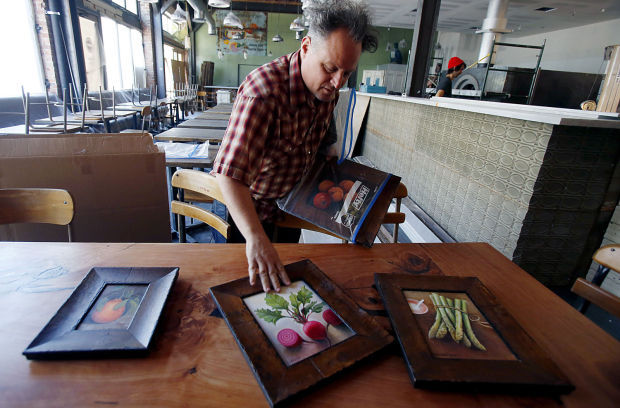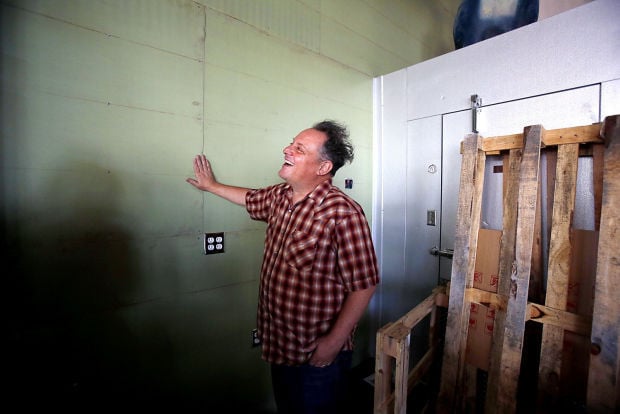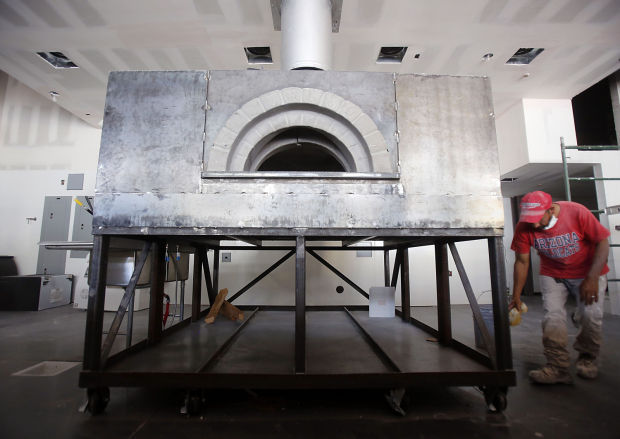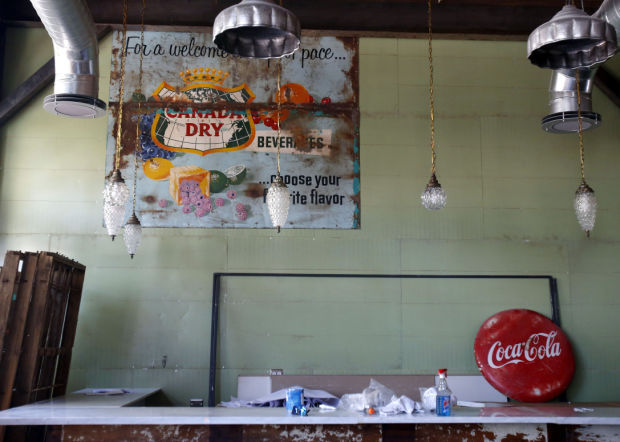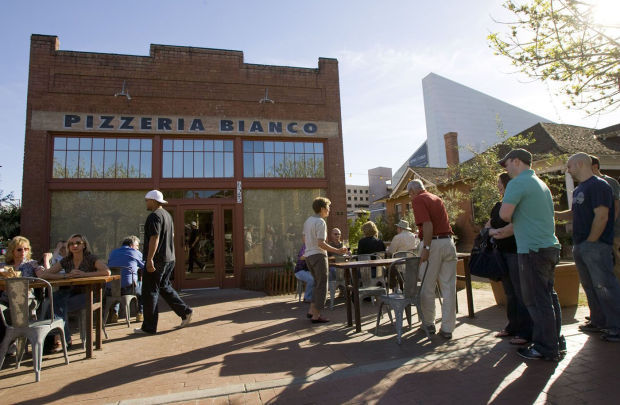Sometime in the next few weeks, Chris Bianco will fire up the oven, swing open the doors and quietly launch the Tucson outpost of his insanely popular Phoenix-born Pizzeria Bianco.
The opening will come well past the fall target Bianco set when he decided to join Tucson’s re-emerging downtown restaurant scene. But along the way, life happened to the 52-year-old Bronx-born, James Beard Award-winning pizza chef.
He and his wife had a baby, and suddenly life — and his 70-hour workweeks — took on new meaning.
He was in no real hurry to slap together a restaurant, he says one recent morning, sitting amid the pulsating rhythm of rush hour on East Congress Street and the clanking banging of workers installing his custom-made wood-burning oven.
Tucson’s Pizzeria Bianco is not a “for now” project for the namesake chef, who calls Jimmy Kimmel and London’s celebrated chef Jamie Oliver close friends and who is himself a marquee name in the food universe. He sees his restaurant here as something that will be around possibly longer than he will.
“If this was a flip house, it would be open and sold,” he says. “But everything I’ve done in my life has been in the forever mode, the long term.”
Finding new purpose
Chris Bianco teases a shock of his unruly salt-and-pepper hair and looks around the 2,000-square-foot room. It is a mess of construction, loud and busy with action on this Friday morning.
“A space always tells you what it wants to be,” he explains, sitting on a wooden chair that he rescued from a Long Beach, California, school district as the banging from the kitchen bursts in spasms. Loud, then soft. Loud, then soft.
“Everything in this space is kind of a marriage of repurposing, just like ourselves. The challenge is how do you integrate it not to be another brick wall. So I left all the scars in it. We tried to celebrate that and put things around to support it.”
Things like the paint-chipped, worn wooden planks salvaged from a Flagstaff barn that get new life backdropping a faux fireplace. Wooden doors circa 1950s, destined to become room dividers. An old preacher’s lectern, its paint faded and chipped, that will serve as the hostess stand. Avocado-green refrigerator panels from the 1950s and ’60s that line another wall. The Canada Dry sign that once greeted shoppers on the side of a grocery store.
The fireplace will be decorated with his father’s paintings, colorful depictions of the beets, tomatoes, asparagus and other fresh ingredients that Bianco employs in his world-famous wood-fired pizzas and salads.
“Pizza itself is such a disarming entity. It welcomes all comers of all economic and socio platforms. It’s cut in triangles; it’s fair play,” he says, choosing his words deliberately, as if every syllable holds a meaning bigger than himself.
This is Bianco’s sixth restaurant, and the first one that perfectly mirrors his flagship Pizzeria Bianco. Just as at that downtown Phoenix restaurant, where diners wait up to three hours — sometimes longer — for a table, his menu will be sparse: a half-dozen pizzas, a couple salads and antipasti, all made by hand from the freshest ingredients Bianco can find.
A pizza-perfect life
Pizza has occupied Bianco’s life since he was a teen, when he got his first job at a shop in his native New York. He moved to Arizona in his early 20s, driven to find a place that would help relieve the symptoms of his asthma.
His Arizona culinary career started unpretentiously, making mozzarella in his apartment to sell to nearby restaurants. That led to making small-batch pastas, which took him to cooking pasta, and then pizza, in people’s homes.
It was then, when he added pizza to the catering mix, that he found his destiny.
He set up his first pizza shop in the corner of a small neighborhood grocery store in 1987. It didn’t take long for word to get out about his pies, dressed with fresh-made San Marzano tomato sauce, fresh basil, housemade smoked mozzarella, fresh veggies and hand-cured meats. The thin crusts bubble from the extreme heat of the wood-fired oven, leaving them alternately crispy and chewy.
Lines formed, and wait times grew. Bianco, who early on had his hands on nearly every pie, realized he could make a life — and a living — with pizza.
In 1994, he brought Pizzeria Bianco to a humble, historic space in Phoenix’s downtown Heritage Square, where almost from the opening day, lines started forming three hours before he opened. The space is small, seating about 40, and there is no takeout or delivery. He doesn’t take reservations.
He opened a bar in the space next door a couple years later to give customers a place to wait. Night after night, the place is jammed with people who sip wine and eat olives, amazingly patient as they anticipate the meal that awaits them.
In 2003, the restaurant earned a national reputation when Bianco won a James Beard Award for best regional chef — the only pizza chef to snag the prestigious honor. That also was the year bread-baking guru and author Peter Reinhart’s book, “American Pie: My Search for the Perfect Pizza,” proclaimed Pizzeria Bianco’s pies the best pizza in the U.S. In 2004, The New York Times and Vogue magazine agreed; Vogue took it one step further, proclaiming Bianco’s the best pizza in the world.
More national reviews, in Bon Appétit, Food & Wine and USA Today, built on his reputation. So has the parade of celebrities — Oprah Winfrey, Diane Sawyer, Jimmy Kimmel and, most recently, former President Bill Clinton — who have dropped his name and swooned over his pizza on national TV.
And all of that is humbling, Bianco says. But at the end of the day, it’s not what drives him.
“One of the biggest things I’m looking forward to,” he says, “is cooking for Tucson.”
Tucson felt like home
At this point in his professional life, Bianco has nothing to prove.
“I have been very blessed — and believe me, I know it,” he says.
But something about Tucson tugged at his heart and made him want to be a part of it, not just a passing observer slipping into town to catch Calexico in concert at the Rialto Theatre or Club Congress.
In September 2012, as he was opening Union Jacks pizzeria in London with Jamie Oliver, Diablo Burger’s Derrick Widmark texted Bianco with an idea: Open Pizzeria Bianco in a funky-cool space on Congress Street, right across Fifth Street from Diablo Burger and fellow Flagstaff transplant Proper.
Widmark, a longtime friend, was making the inroads himself after coming up empty in Phoenix, where he had considered opening a second location of his Flagstaff restaurant.
“Everything I had been looking for in Phoenix I found in downtown Tucson,” says Widmark, who opened in Tucson last year.
“I describe it as a combination of authenticity and community,” he says. “The combination of those qualities is hard to find in the rest of the state. We have it in Flagstaff and I was very excited to find it in Tucson.”
Bianco checked out the building and fell in love. But it was more than just the scarred brick walls that spoke to him. Like Widmark, he felt a sense of belonging.
“It just felt like home,” he says. “It just seemed like no matter where I was in the world, Tucson just kind of felt right.”
Bianco has taken his time renovating the space. Every aspect of the building, which dates back to 1919, has a story to tell, and he has carefully curated that story in every detail.
“I’ve never done a space that was perfect, here or in London or Phoenix. But the intention is that they finish with a sincerity,” he says. “Perfection is like pizza; you love it or you don’t love it. But when you go into something, you understand the elements that will make it special.”
Bianco had planned to open last fall. But aside from the routine construction delays, his life got in the way. He and his wife, Mia, whom he married in February 2013, welcomed their first child, a daughter, in April.
“She’s the greatest thing and already the greatest teacher of my life,” he says.
Bianco says he plans to be a regular presence in Tucson, much as he is at his Phoenix restaurants, where he is known to step away from the pizza oven, wearing shorts covered by an apron, and chat with customers. He expects to cook alongside members of his staff of 15 or so, several of them recruited from Phoenix to assume leadership roles here.
Great expectations
Bianco looks around the dining room, only a few pieces of his puzzle left undone, and gets almost giddy. All that stands in the way of opening now is some fine-tuning and a few dry runs to help the staff find its Tucson rhythm. It could take a week; it could take several weeks. There’s no rush.
“When he’s ready to open, I’m ready,” says Bianco’s landlord, downtown developer Scott Stiteler. “I’m sitting back and saying, ‘Chris, whatever you need, whatever it takes, I’m there for you’.”
When he does finally open, like it or not, Chris Bianco’s reputation will precede him. People expect great things to come out of the kitchen at 272 E. Congress St.
“Potentially, I would like to think I can add something special to something that’s already special,” he says. It’s quickly apparent, from the way he looks down and laughs nervously, that he is not entirely comfortable cast in the starring role. “I’d like to think I can shine a light on something I already see as beautiful.”
But Diablo Burger’s Widmark and Downtown Kitchen’s Janos Wilder believe that having Bianco downtown is a game changer.
“It means a lot that he’s coming here,” Wilder says. “It’s another good restaurant downtown and, because he’s got a really great name, it will continue to bring notoriety and attention to downtown. And that’s all good for us.”
“Chris can pick up a phone tomorrow and open a restaurant anywhere in the world,” says Widmark. “For somebody who could go anywhere to come to Tucson, for me personally, that corroborates that I made a good choice for my business.
“Chris will take coming to Tucson above and beyond what any of us are able to contribute. And that’s not just because he’s famous and he’s been on Oprah. It’s because of the person he is. He leads with his heart. Pizzeria Bianco is not a concept. It’s his life. It’s his passion.”
And he wouldn’t bring that passion to Tucson if the relationship didn’t feel right.
“I’m not creating anything; I already see it as a beautiful, complete city with great art and great music and great natural beauty and great demographics,” he says. “It’s a place I want to spend time in and be a part of.
“I need it more than it needs me.”


